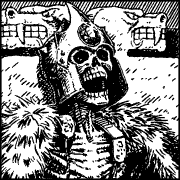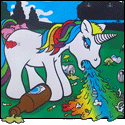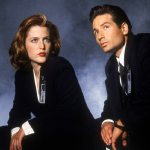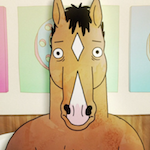|
I just finished a short story that I thought turned out really well, but the question of "city-specific" references kept coming up. Since I live in nyc I thought they'd be nice touches, but won't this kind of pigeonhole me down the line? (IE remaining consistent with the level of specificity, even if the characters need to go somewhere/do something I don't know a lot about)
|
|
|
|

|
| # ? Apr 29, 2024 18:11 |
|
change my name posted:I just finished a short story that I thought turned out really well, but the question of "city-specific" references kept coming up. Since I live in nyc I thought they'd be nice touches, but won't this kind of pigeonhole me down the line? (IE remaining consistent with the level of specificity, even if the characters need to go somewhere/do something I don't know a lot about) I don't think it's a big deal to worry about. If you know an area, specific references are a big plus. If not, then well, you should do some research anyway. You're not expected to know every little detail of every place you might want to take your characters, but yeah, you should at least put in some effort to try and make it as accurate as you can. * * * Minor silly question, in the world I'm building, the country which is a rough equivalent to China is called Xiang (pronounced ecks-AYE-eng [which is often mangled into sigh-eng.]) I'm trying to figure out which of these sounds better as a way to refer to someone from there: "You want the stall past the Xianese fish merchant." "You want the stall past the Xiangi fish merchant." "You want the stall past the Xianian fish merchant." Stabbey_the_Clown fucked around with this message at 06:23 on Jan 7, 2013 |
|
|
|
change my name posted:I just finished a short story that I thought turned out really well, but the question of "city-specific" references kept coming up. Since I live in nyc I thought they'd be nice touches, but won't this kind of pigeonhole me down the line? (IE remaining consistent with the level of specificity, even if the characters need to go somewhere/do something I don't know a lot about) Personally, I find specific geographical references to be a huge plus when I read. I strive to do the same in my writing, and I use Google Maps and Street View a lot as well as other types of research. I really hate the "Metropolis City" and "Smalltown, USA" bullshit some writers like to use, but it's really a matter of personal preference. I say do it.
|
|
|
|
Stabbey_the_Clown posted:I don't think it's a big deal to worry about. If you know an area, specific references are a big plus. If not, then well, you should do some research anyway. You're not expected to know every little detail of every place you might want to take your characters, but yeah, you should at least put in some effort to try and make it as accurate as you can.
|
|
|
|
SurreptitiousMuffin posted:For the record, most people will read X as Sh and most westerners will read Xiang as Shang. Or zee-ang. Personally I hate when people make up words for their fantasy stories and spell them in a way that makes you mispronounce them. I was really annoyed when I got to the end of the first Wheel of Time book and saw the pronunciation guide and found out that "cuendillar" was meant to be pronounced "CWAIN-de-yar", because why would you spell it with Ls if you wanted it to be pronounced a Y? They don't speak English or use the Latin alphabet in that world, so when you're making up words for things that don't exist in reality you can just spell them phonetically (or close to it).
|
|
|
|
Stabbey_the_Clown posted:Minor silly question, in the world I'm building, the country which is a rough equivalent to China is called Xiang (pronounced ecks-AYE-eng [which is often mangled into sigh-eng.]) There is a city in China called Xi An 西安 and pronounced as "See Aren't" though. Are you sure you want to name it that?
|
|
|
|
The Saddest Rhino posted:There is a city in China called Xi An 西安 and pronounced as "See Aren't" though. Are you sure you want to name it that? Pronunciation is closer to "see on." But yeah, romanized Chinese is all kinds of unintuitive, so maybe better to either learn one of the systems or steer clear altogether.
|
|
|
|
Stabbey_the_Clown posted:the country which is a rough equivalent to China is called Xiang (pronounced ecks-AYE-eng [which is often mangled into sigh-eng.]) Don't do this. Definitely don't do this. The other guys already made it pretty clear why, but I just want to echo them. I see "Xiang" and I immediately thing "shang" or "zhang." Using an X to start a word is often an "X is cool gaiz!" thing which is also bad. Don't do that unless it's in a way that makes sense. Why not just spell it "Ixang" or something if you really want that pronunciation?
|
|
|
|
Okay, thanks for the helpful notes. I guess even if it's not actually Earth, it's still a good idea to make my analogues stick as closely as possible to the real thing. Since it isn't on Earth, I'm not sure I want to use actual Chinese words, but on the other hand, I don't want to just completely make up a language. I'll have to but a lot more thought into what I want to do. I'll do some research and find a better name. I don't care what letter it starts with, it's not an "X is cool" thing. That place isn't important in the story, it's just background stuff to suggest a larger world. Stabbey_the_Clown fucked around with this message at 19:24 on Jan 7, 2013 |
|
|
|
Martello posted:Don't do this. Definitely don't do this. The other guys already made it pretty clear why, but I just want to echo them. I see "Xiang" and I immediately thing "shang" or "zhang." And I'd pronounce it more like "Shee-ang." Some Mandarin speakers also have an accent called an erhua, where they add an "er" sound to certain words, so that "shi" sounds like "shir." Four out of five posters agree: if you're going to be using spellings that are reminiscent of or derived from a particular language, it's best to use the pronunciation, as well. Otherwise, you'll have to endure linguist nerd rage. Tartarus Sauce fucked around with this message at 15:01 on Jan 7, 2013 |
|
|
|
Tiggum posted:I seem to have come across poorly. I'm not saying everyone should try to be the best, or that fanfiction can't be good. I just don't understand the desire to write it. I just don't see the appeal. If you liked a story and want to write something like it, well, you can do that without it being fanfiction, you can just write something similar. The same applies if you think there was a glaring flaw in the original and you would have done it differently. Just do that then. Write your own version. Part of it is the immediate audience, I might have been too reactionary in my response, I'm pretty defensive of fan fiction and fan art because I think they're just for fun most of the time. Now the depravity that is displayed I could do with out. I actually haven't been in the thread much recently and I've been having an issue writing anything at all--writer's block for sure. I denied that was what it was until recently. But I've never been a person who had this problem before. Not sure what caused it, though I suspect it to have to do with work and how it's taking a toll on everything that I like to do. I had a short story I planned to self publish that was most of the way done, I scrapped the beginning of it because of the connection to a friend's work which was a bad idea in truth. Now I have no idea how to start it and the stuff I wrote after the start will not fit with the rest of the stuff I have.
|
|
|
|
CB_Tube_Knight posted:Part of it is the immediate audience, I might have been too reactionary in my response, I'm pretty defensive of fan fiction and fan art because I think they're just for fun most of the time. Now the depravity that is displayed I could do with out. Get your rear end in the Thunderdome. We'll sort you out.
|
|
|
|
Gonna pour my heart out here- rejection is poo poo. Two on the same day is shittier. This week is a crapfest and it's only Thursday. I guess I should be glad they didn't leave me hanging forever. But that just means I didn't make it beyond. the interns/grad students/slave labour. Whinge over, submitting to new places. On a more cheerful note, how many times do you submit a story to new places before you resign yourself to the fact that it's not finding a home?
|
|
|
|
Successful writers do, apparently, until they run out of new places. 
|
|
|
|
There's really no reason to get depressed about rejections. Having your story rejected doesn't necessarily mean anything about its quality, it just means it wasn't right for that market at that time. Keep submitting it and if you literally run out of places to submit and it's been rejected from every one, then, well, maybe that does say something about its quality, but chances are someone will accept it if it's truly ready for publication. It's a nice feeling when a previously-rejected piece finds its home in a legitimate journal 
|
|
|
|
squeegee posted:There's really no reason to get depressed about rejections. Having your story rejected doesn't necessarily mean anything about its quality, it just means it wasn't right for that market at that time [...] Nice to have someone say this, even though I know it. My hate and envy-fueled submitting phase is petering out and I'm actually going to have to move into an ambition-fueled one.
|
|
|
|
Can I gripe about something that's been bothering the crap out of me lately? awful dialogue and cliched characters in every loving book I try to pick up and read. I don't know if any of you have read The Passage by Justin Cronin, but it got really raving reviews by the NYT and stephen king and everyone else so I figured hey why not. I'm only through the first 200 pages or so (out of eightloving hundred apparently) and it's already one of the most terrible books I've read in years. And the biggest reason is because the dialogue reads to me like it's at the 9th grade level, and every single character interaction ends with me going "yep, that sure is some words those guys exchanged. Everything went pretty much how I figured it would. Sure am glad the author felt it was necessary to place me here so I could experience this completely expected and routine interaction that didn't tell me anything about anything." For example, I'm cutting and pasting an exchange here that one of the characters has as he calls up his recently re-married ex-wife (who is also pregnant with the new guy's baby): quote:hell— he did what he’d told himself he wouldn’t do and dialed Lila’s number. Am I having a stroke or something? That is really awful dialogue, right? "Everything is fine. Everything is normal."  "You're making me sad." "You're making me sad." Or is there something I'm missing? My concern is that the impression I have about the above exchange is essentially how I feel about every book I'm trying to pick up and read right now: cliche characters, awful dialogue, bland interactions that go pretty much exactly how you'd expect them to. loving yawn. Chillmatic fucked around with this message at 15:34 on Jan 10, 2013 |
|
|
|
It's what the mass market demands. It's the same on TV and in movies in case you hadn't noticed.
|
|
|
|
I don't know. That dialogue is sure nothing to call home about (get it?), but if you have to fill 800 pages with something, might as well put this in there.
|
|
|
|
I'm with Chillmatic. That dialogue bored the gently caress out of me, and I started skimming a third of the way into it. Were they going for "realistic" rather than interesting?
|
|
|
|
I find that a good 75% or so of the books I randomly pick up in the new fiction section of the library are like that. Just pages and pages and pages of mundane drama and boring dialogue with no subtext and artless execution. I'd much rather read something with the same plot but with evocative language and multiple layers of meaning and no meaningless filler, but that's I guess that's not what people want because this stuff is getting published left and right. Yawn.
|
|
|
|
STONE OF MADNESS posted:It's the same on TV and in movies in case you hadn't noticed. No, it's really not. I mean maybe on some terrible shows it's like that, but as a rule everything I've seen in movies and TV recently is miles better than the loving garbage I posted here. Even this random line from the Gilmore Girls (don't laugh, it's actually got some of the best dialogue I've ever seen) is instantly more engaging and funny: [Lorelai picking up her daughter at the airport] Lorelai: Oh, but I got here early and there was nothing to do except feed gummy bears to the bomb-sniffing dogs which, apparently, the United States government frowns upon. Rory: You got in trouble with the government while you were waiting for me? Lorelai: Just a little. Rory: How much is a little? Lorelai: Learn Russian. Writing good dialogue is really not that hard which is why I'm so baffled as to what the problem could be. Like Squeegee said: quote:pages and pages and pages of mundane drama and boring dialogue with no subtext and artless execution. The "no subtext" part is what really stands out for me. In real life, people never ever say what they mean. Nobody does. And bad dialogue is just full of people speaking plainly and flatly about what it is they're thinking which is so god drat boring. And on the other end you have melodrama ("you're making me sad!") because apparently nobody knows how to use subtext anymore. What really depresses me about The Passage is the endless reviews talking about how amazingly well it's written and how engaging the characters are. 
Chillmatic fucked around with this message at 16:42 on Jan 10, 2013 |
|
|
|
I mostly hate the guy's internal running commentary. It violates my "show, don't tell" sensibilities. Without it, the scene would just be melodramatic and boring, but not criminally so. My main problem with it, I think, is that it comes across as a tempest in a teacup, and maybe that's because I'm not invested in these characters, because I don't know who they are. They take a long time to get to their point, but I'm not feeling any building emotional turmoil or anxiety that would allow me to sympathize with them as they struggle to get there. Instead, my eyes glaze over as I see the characters engage in some vague burbling about Texas. But, it's not the worst dialogue I've seen. Unlike other books I've come across, at least these people sound like they could be real people (and that may be part of the problem, because real people say a lot of boring, irrelevant, tangential, and circumstantial stuff that would never make for good book or movie dialogue).
|
|
|
|
A fiction writing tip that I've always found helpful is that your characters should never directly respond to each other or literally answer each other's questions. I do think the "never" aspect of this can be taken too far, because I've read stories that take this infuriatingly to heart and everyone is just spouting out mysteriously dense sentences past each other while staring off into the distance, but it's a good thing to keep in mind. Fiction dialogue should not mimic real life dialogue; it should distill it to its essence and it should always advance character, plot, or theme, preferably in multiple ways. The way a character responds to a question or statement should show something about his/her values, concerns, thought process, or priorities. It's hard to do that when they're just literally responding to each other in the small-talk kind of way that real people do.
squeegee fucked around with this message at 16:45 on Jan 10, 2013 |
|
|
|
Tartarus Sauce posted:(and that may be part of the problem, because real people say a lot of boring, irrelevant, tangential, and circumstantial stuff that would never make for good book or movie dialogue). Nooooo, that's not true at all! I mean, maybe real-life people talk very plainly and boringly when discussing boring situations (such as how their day at work went) but those are not things that people in a novel should be talking about. (because no one gives a poo poo) But when real conflict is present, or when someone desires something from the other person-- sex, power, money, whatever-- then even in real life there is always a bunch of unsaid stuff. A fleeting downward glance, a hand brushing against a thigh, an icy stare, a shouted proclamation of love that should've been a whisper, etc and so forth. I really think the confusion here arises from the fact that authors too often include utterly banal interactions in their novels; interactions that couldn't possibly ever be made interesting. And so what happens is that other writers then believe that good dialogue consists of people who "don't talk like real life people do" when the truth is more along the lines of: good dialogue consists of compelling people talking about compelling things. Chillmatic fucked around with this message at 16:48 on Jan 10, 2013 |
|
|
|
Chillmatic posted:I really think the confusion here arises from the fact that authors too often include utterly banal interactions in their novels; interactions that couldn't possibly ever be made interesting. And so what happens is that other writers then believe that good dialogue consists of people who "don't talk like real life people do" when the truth is more along the lines of: good dialogue consists of compelling people talking about compelling things. Real-life people say "uh", and "um", they stutter and repeat themselves, they use five sentences when one could do. Dialogue should ultimately ring true and sound real, but it shouldn't sound like a transcription of a recorded conversation, because no one wants to read that. I don't think I've ever read good, satisfying dialogue that sounded 100% literally like the way real people talk. At the other end of the spectrum is stiff, awkward, unrealistic dialogue, but there's a good middle ground to play around in. I agree with you about subtext-- that's essential-- but in as much as the actual words and sentence structure that people use, good dialogue should be the distillation of all the things that real people say and the ways that they say them, not a literal transcript of reality.
|
|
|
|
uberwekkness posted:First time posting here, so hopefully this hasn't been covered somewhere else. Depending on the circumstance, just ask around for people you think are likely to have experience with those emotions. It seems like posting here about the emotions you're looking at isn't a bad idea either. It could be against the rules though so make sure to check prior just in case I'm giving you bad info. Otherwise drop me a PM. I've got a unique base of experience with emotions from all aspects of life and I'd be happy to either give you my thoughts or see if I can point you in the right direction.
|
|
|
|
squeegee posted:Real-life people say "uh", and "um", they stutter and repeat themselves, they use five sentences when one could do. Dialogue should ultimately ring true and sound real, but it shouldn't sound like a transcription of a recorded conversation, because no one wants to read that. Well, yeah. I thought that was something so obvious that it wasn't worth pointing out. Maybe because I actually can't recall ever reading anything that was written like that, so I guess I didn't even think that could be a problem; and I've critiqued a lot of garbage. Here's another bang-up example of great dialogue in The Passage! (the author inexplicably goes back and forth between normal quoted dialogue as in the previous example, to poo poo like this with dashes to mark dialogue and no quotes.) quote:
I see Cronin took this from the "get your dialogue from the nearest country song" school of thought! Chillmatic fucked around with this message at 17:18 on Jan 10, 2013 |
|
|
|
This conversation about dialogue is interesting because I always thought of myself as a strong dialogue writer, but I kind of wonder if that skill has atrophied. Especially since I'm not finding anything outwardly offensive about these passages, but you're right, my eyes are glazing over before I can even get halfway through each one.
|
|
|
|
Chillmatic posted:Well, yeah. I thought that was something so obvious that it wasn't worth pointing out. Maybe because I actually can't recall ever reading anything that was written like that, so I guess I didn't even think that could be a problem; and I've critiqued a lot of garbage. Sure, it's obvious to you and me, but a lot of people who are just starting out seem to take advice really literally. "Write dialogue that sounds like the way real people talk" is good advice at its core but it can be misleading. Good writers don't write dialogue that is identical to the way real people talk; they write dialogue that sounds like it could come from real people. There's a difference, and I think that a lot of new writers fail to realize that. This is all just my opinion, of course, but it's never steered me wrong as far as writing dialogue (something which I once really sucked at but am now told is one of my strengths.) Open up a good book, though-- something that you really admire that has a good amount of dialogue-- and really dissect what the characters are saying. Then go outside and find some strangers to listen to who are having a conversation about something at least a little bit compelling. Generally the dialogue in the book will be a tightened-up, carefully worded version of what a real person might say, distilled down to its most important elements while still "ringing true."
|
|
|
|
squeegee posted:Sure, it's obvious to you and me, but a lot of people who are just starting out seem to take advice really literally. "Write dialogue that sounds like the way real people talk" is good advice at its core but it can be misleading. Good writers don't write dialogue that is identical to the way real people talk; they write dialogue that sounds like it could come from real people. There's a difference, and I think that a lot of new writers fail to realize that. Agree 100% percent. quote:Open up a good book, though-- something that you really admire that has a good amount of dialogue-- and really dissect what the characters are saying. Honestly this is what's depressing me. I'm having a really hard time finding such books lately. It seems the current climate in publishing has currently swung to selling stories based on massive mythologies/worlds/stories rather than on intriguing characters within those worlds. I'll take any suggestions from anyone as to books they've read recently that they think have killer characters/dialogue!
|
|
|
|
I've got a little reveal that sounds a bit clunky. Original Max raced down the hallway, a few wisps of white smoke trailing in his wake. I’m so glad the smoke bomb worked. This is first sentence of a new chapter, and the first time that I've revealed that Max had a smoke bomb - I was deliberately keeping that from the reader to make them wonder what his plan was. It sounds a little clunky, though. I've got a couple variations, but I'm not sure which is better. Max raced down the hallway. White wisps of smoke from his smoke bomb left a brief trail in his wake. I’m so glad that worked. Max raced down the hallway, trailing white smoke behind him. This was too dangerous. If that smoke bomb hadn't worked... well, I'm just glad it did.
|
|
|
|
I skimmed past your opening and read what you quoted, holllly poo poo. I thought I was reading some of your(no offense, I didn't know who you were when I was reading it) amateurish writing. I think what I hate most falls in to two seperate things. One, the author is trying real hard to TELL us things and not SHOW us them. The forced silences and talking quiet, they're really not subtle at all. Him suddenly stopping the conversation to reminisce about a baby, assuming this is how they tell you a baby exists it's really forced, nothing here flows. Second is the terrible Lila dialogue. It's not organic at all, feels like the writer was writing completely out of his comfort zone and has no idea how a conversation like that would go. Chillmatic posted:hell— he did what he’d told himself he wouldn’t do and dialed Lila’s number. Edit: I think ideally good expositional dialogue should go unnoticed by the reader, I shouldn't know the author is trying to fill me in on the lives, it should just flow with the natural dialogue. It really doesn't seem like that worked here.
|
|
|
|
squeegee posted:I don't think I've ever read good, satisfying dialogue that sounded 100% literally like the way real people talk. At the other end of the spectrum is stiff, awkward, unrealistic dialogue, but there's a good middle ground to play around in. I agree with you about subtext-- that's essential-- but in as much as the actual words and sentence structure that people use, good dialogue should be the distillation of all the things that real people say and the ways that they say them, not a literal transcript of reality. Right. You're creating the appearance of authenticity, without the "authentic" conversational fat and gristle that doesn't actually serve your story or characters. Subtext, meanwhile, is vitally important, because it adds another layer to dialogue to make it genuinely interesting. The most interesting exchanges, I think, tend to be ones which convey meanings or messages on two or more levels. Dialogue where everyone says and conveys precisely what they mean, and receives and interprets messages exactly as sent, just isn't that interesting or engaging after a while, because there's no conflict. I'll continue to think about who writes good dialogue. As for who writes bad dialogue, I've always thought everyone in L.E. Modesitt's books sound like robots who are trying to pass the Turing test. Tartarus Sauce fucked around with this message at 00:18 on Jan 11, 2013 |
|
|
|
squeegee posted:A fiction writing tip that I've always found helpful is that your characters should never directly respond to each other or literally answer each other's questions. I do think the "never" aspect of this can be taken too far, because I've read stories that take this infuriatingly to heart and everyone is just spouting out mysteriously dense sentences past each other while staring off into the distance, but it's a good thing to keep in mind. Fiction dialogue should not mimic real life dialogue; it should distill it to its essence and it should always advance character, plot, or theme, preferably in multiple ways. The way a character responds to a question or statement should show something about his/her values, concerns, thought process, or priorities. It's hard to do that when they're just literally responding to each other in the small-talk kind of way that real people do. This is an excellent rule. Weirdly, I first read it in a Dilbert book. The same book had a great rule of thumb for humor: The core of humor is what I call the 2-of-6 rule. In order for something to be funny, you need at least two of the following elements: Cute (as in kids and animals) Naughty Bizarre Clever Recognizable (You've been there) Cruel Edit: ^Stabbey, I'd give him a sudden flash of some horrible consequence of 'it' not working. As it is it's way too abstract. However I worry you're overusing interior monologue, based on tis and the other excerpt I looked at (which was improved, btw, sorry for not replying to your pm) sebmojo fucked around with this message at 00:29 on Jan 11, 2013 |
|
|
|
Oh, for the record, I've decided to change the name of Xiang to Tsheng (which, if I'm understanding the Mandarin pronunciation guide correctly, would be pronounced "Tshung").sebmojo posted:This is an excellent rule. Weirdly, I first read it in a Dilbert book. Ha ha, me too. I've got that book, and try and keep that in mind when writing dialogue. quote:Edit: ^Stabbey, I'd give him a sudden flash of some horrible consequence of 'it' not working. As it is it's way too abstract. I didn't include the next sentence, which was about the horrible consequence - the smoke bomb worked, but he didn't expect the people he used it on to start shooting their guns, which is about to attract a whole lot of guards. (And also later on when he needs the second smoke bomb to work, it does not.) EDIT: I mis-read what you said. The horrible consequence of it not working was him getting his throat cut by the angry criminals. I can add that in, sure. quote:However I worry you're overusing interior monologue, based on tis and the other excerpt I looked at (which was improved, btw, sorry for not replying to your pm) In a couple of chapters, it won't just be interior monologue, but occasionally interior DIALOGUE as well, so again, I have to keep some of the exact thoughts stuff. I could convert a lot of interior monologue (replace I with he and such), but to me, that seems like it's keeping the reader an extra step away from connecting with the character. It makes the piece seem more impersonal and feel more rushed. I guess I can do that if I work harder on it, though: Here's that sentence which should convey Max's thoughts without direct inner monologue. Max raced down the hallway, trailing white smoke behind him. This was more dangerous than he'd planned. If that smoke bomb hadn't worked, the gang would have cut his throat then and there. That would have been a terrible waste of the expensive Tshengi rug. I'm not sure how much of the inner dialogue I should convert, but after I finish my "10% Solution" pass on the chapter, I'll make a thread for it. Stabbey_the_Clown fucked around with this message at 04:53 on Jan 11, 2013 |
|
|
|
Chillmatic posted:
The biggest problem I see with that (apart from the dashes instead of quotation marks) is that it's really hard to interpret Bill's tone. It's clear he goes from laughing at her to angry at some point, but not clear where that happens, and then at the end is he contrite? Whining? Still angry? I can't tell. The same applies to Jean, but I think her tone is supposed to be consistent through the whole conversation? But I cant tell if she's angry or resigned or sad or what. squeegee posted:Open up a good book, though-- something that you really admire that has a good amount of dialogue-- and really dissect what the characters are saying. Then go outside and find some strangers to listen to who are having a conversation about something at least a little bit compelling. Generally the dialogue in the book will be a tightened-up, carefully worded version of what a real person might say, distilled down to its most important elements while still "ringing true." If you really want to see the difference, record a conversation and then transcribe it. It's amazing how much people repeat themselves, stutter, start a sentence and then abandon it halfway through, or change what they're talking about halfway through the sentence. You don't notice it when you're listening to them in a normal conversation, but writing it down makes it really clear.
|
|
|
|
Tartarus Sauce posted:You're creating the appearance of authenticity, without the "authentic" conversational fat and gristle that doesn't actually serve your story or characters. The great dialogue writers (like Elmore Leonard) manage to recreate the cadence and flavor of the spoken word and put it on the page, but when you think about it, scripts need to do the same thing and work in both directions, so good film/television dialogue is always worth listening to. What I like even better is a good transcript, because at its best a good transcript takes good dialogue, refines it through good actors (who hopefully distill the script into its most natural-sounding form while retaining all that good storytelling subtext), then translates the refinement right back into prose form. Yes, you have to make a few allowances when considering the change in format, but transcripts are literally what juicy dialogue looks like. Skimming a good exchange can jumpstart your brain into bridging the audio-visual gap. A transcript--as opposed to a script--can be hard to come by, but sometimes I'll pause what I'm watching and create my own abbreviated versions. Of course you'll have to consider what flavor best matches your own dialogue goals. Chinatown or Deadwood? Annie Hall? I think some of the best television dialogue right now is on FX's Justified, which is based on (surprise surprise) work by Elmore Leonard.
|
|
|
|
Belated thanks for the responses to my last question. I do feel more like writing when I read good books - or sometimes bad books. ("I can do better than this published crap" is a pretty good motivator, actually.) What got me going on something other than roleplaying for the first time in years was the pledge thread. Getting feedback from people who care about writing helped immensely, as did setting the goal for X number of words a day and feeling like I had to live up to that. What this means is I have to learn how to do decent critique so I can start posting stuff in Fiction Farm, I guess. The specific thing that's been bugging me was that I hadn't worked on my NaNo project (which I want to finish and ultimately try to publish) since the end of November. I knew I was stuck because events were out of order, but I didn't know how to fix it. Yesterday I think I finally figured out what needs to be done. Now I just need to kick myself to make the changes and move on. Chillmatic posted:I'll take any suggestions from anyone as to books they've read recently that they think have killer characters/dialogue! I finished Among Thieves by Douglas Hulik (2011) a few weeks ago and thought it was very good about that. It's very much character-driven, with just enough worldbuilding to serve the story (and I should use it to learn how to write action scenes because he writes some great combat). I also like Carol Berg and Lynn Flewelling for characterization, though Lynn's got some technical problems - her dialogue gets unnatural if there's exposition to be had, and she has a bad habit of switching perspective mid-paragraph. I also don't know how recent you're talking so they may not be terribly relevant. That first excerpt was just unremarkably boring until I got to "You're making me sad." Nice of you to tell us that since there was no other way to know. (People don't talk like that.) The second is barely comprehensible with those dashes since they're not even consistent.
|
|
|
|

|
| # ? Apr 29, 2024 18:11 |
|
Chillmatic posted:Can I gripe about something that's been bothering the crap out of me lately? awful dialogue and cliched characters in every loving book I try to pick up and read. I bought The Passage for my dad when it came out and bought part 2 (The Twelve) for him for Christmas. It's not something I'd ever pick up and read (more on that later), but he enjoyed it. I couldn't ever see "boring, poorly written, banal writing" ever being a complaint of his. Or even "bad writing" in general. If you hear him talk about a book he likes, like The Passage, he is talking about the plot -- I got it for him because I know he loves Stephen King and The Stand in particular and the book jacket makes that comparison. He is going to talk about zombies and the end of the world and whatever the gently caress, and if he did not like the book, it is going to be how that poo poo didn't work not that it wasn't written well, even if in reality those things are probably intertwined. What this comes down to is that some generic dialogue in a gigantic book about zombies and the post-apocalypse is only really going to bother people who care about good writing (the minority). The plot, the ghouls, the action, the pacing, the world building, the stakes, the buildup and conclusion, etc. For a good example of this, look at the reasons heavy genre readers praise or condemn a book. Those things are all tied into good/bad writing (at a craft level) too, but less visibly and sometimes lovely writing is just incredibly compelling to massive amounts of people due to some other factors. Try to explain Twilight's popularity. Something I find way harder to explain is how to be selective and find well-written books. Other than avoiding the front display table at Barnes and Noble anyway. Recording books that you hear of or are recommended to you by reliable sources helps. I have a large to-read list. Goodreads recommendation tool can be pretty useful if you have a fair amount of books entered. I am totally someone who tries to read a very wide variety of authors rather than consuming the whole oeuvre of a favorite quickly and that can help; it increases my "I like to read writers like X" pool. I almost never just take a book off of a shelf with no recommendation if it's not an author I am aware of. And if I do, I sit down at the bookstore and read the first 20 pages. I think it's sort of a snowballing process -- as you get better at trying to find well-written books, it becomes easier to do so. For me, anyway. EDIT: I'm trying to think of some awesome dialogue writers I like. Salman Rushdie for sure. ultrachrist fucked around with this message at 00:58 on Jan 12, 2013 |
|
|

























